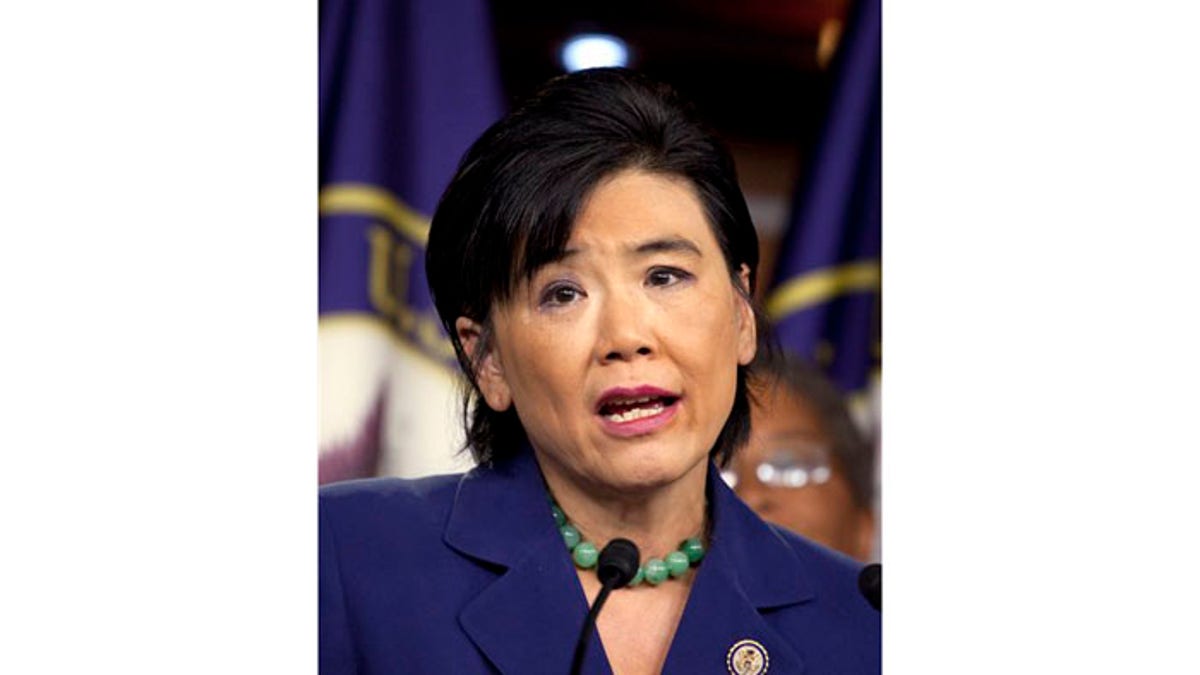
July 20: Rep. Judy Chu, D-Calif., speaks at a news conference on Capitol Hill in Washington. At a House Armed Services hearing on military suicides Friday, Sept. 9, 2011, Chu testified, and in a dramatic moment described the death of her nephew, Marine Lance Cpl. Harry Lew, 21, who put a gun to his head and killed himself while in a foxhole in Afghanistan after fellow Marines allegedly hazed him one night. (AP)
KANEOHE BAY, Hawaii – A military court hearing for three Marines accused of hazing a fellow Marine who later committed suicide in Afghanistan focused Thursday on whether the accused intended to harm the deceased or discipline him so he would stop falling asleep while on watch duty.
The Marines are charged with "wrongfully humiliating and demeaning" 21-year-old Lance Cpl. Harry Lew, of Santa Clara, Calif., who shot himself with a machine gun April 3 in the Helmand province of Afghanistan.
Lew had been caught sleeping on duty multiple times at the remote Gowragi Patrol Base close to Taliban positions.
Sgt. Benjamin E. Johns, Lance Cpl. Carlos Orozco III and Lance Cpl. Jacob D. Jacoby face an Article 32 hearing, the military justice equivalent of a grand jury proceeding. The hearing got under way at Marine Corps Base Hawaii at Kaneohe Bay, where the three are based, to determine whether there's enough evidence for them to go to trial.
The commanding officer of the platoon testified Thursday that he didn't think Jacoby was hazing Lew when he punched and kicked Lew's body armor after the Marine was caught sleeping on watch again. "I think Lance Corporal Jacoby lost his temper," said 1st Lt. Jameson Payne.
"I think he was upset Lance Cpl. Lew was jeopardizing everyone's lives."
Jacoby, 21, is accused of kicking and punching Lew in the head. He is also charged with threatening Lew with harm. Johns, 26, and Orozco, 22, are also accused of dereliction for failing to supervise and ensure the welfare of Marines under their care.
Orozco, 22, allegedly ordered Lew "to do pushups, side planks, leg lifts with a sandbag, while wearing full personal protective equipment and pouring sand onto his face," according to the cruelty and maltreatment charge against Orozco. He is also charged with assault for kicking Lew in the head and stomping on his back.
Lt. Col. Curtis L. Hill earlier said in a statement that, "the Marine Corps does not tolerate hazing of any kind. When allegations of hazing are made, they are investigated and if substantiated, appropriate corrective action is taken."
Hill also said the military justice system "will be transparent to the fullest extent possible under the law to demonstrate fairness and accountability."

